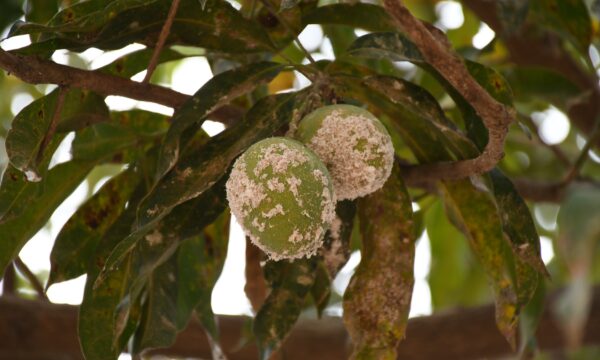Nineteen plant doctors from the eastern and central region of Uganda are equipped and ready to give good advice to farmers – by Jane Frances Asaba and Joseph Mulema in Kampala, Uganda and Phil Taylor in UK
As Plantwise Uganda continues to roll out more plant clinics, the need for training of plant doctors to ensure effective, affordable, locally-accessible and safe advice to farmers has become increasingly urgent. Partners and individual plant doctors are demanding more training and access to information to keep up with the need from smallholder farmers for good advice against crop pests.
Nineteen Plant doctors working in four districts of eastern and central Uganda came together recently to undergo specialized trained in Plantwise’s Module 2, or “Plant Healthcare.” Organized by Plantwise Uganda and Self Help Africa, a partner who run clinics and coordinates others in various regions, this training covered pest identification and treatment, including responsible use of pesticides and insecticides. “The information given, such as the list of banned chemicals, will help me to provide better services for farmers, thus reducing crop losses,” says Rebecca Kwagala, Assistant Agricultural Service Provide in Kayunga and plant doctor trainee. Kwagala notes that this protection of crops is “making farmers more food secure, and moving them from subsistence to commercial farming.”
Participants included staff of Self Help Africa, local government extension workers and representatives of the National Agricultural Advisory Services (NAADS). This was the second round of Plantwise training for participants, who had all previously attended Module 1 “Field Diagnosis and Running Plant Clinics” where they learned how to set up a regular plant clinic in markets and other public places. These plant clinics, now numbering over 413 in over 24 countries, are a cornerstone of the Plantwise plant health system. High-quality training to support regional knowledge makes these plant clinics both dynamic and sustainable. “The course has been very good and it has refreshed my knowledge in grouping of pests and disease management options, says Oboi Andrew, District Agricultural Officer for Ngora. “It has helped me to appreciate the effectiveness of different control methods and how practical each method is at farm level.”
Training was led by Dr. Joseph Mulema (CABI Africa) with support from 3 locally-based plant doctor trainers: Benius Tukahairwe, who is also the Plantwise Desk Officer, based in the Ministry of Agriculture, Animal Industry and Fisheries, Joab Tugume, from the Ministry of Agriculture, and Alex Semakula, a staff member of Self Help Africa.
At the end of three-days of training, participants were highly motivated to go out and get started. As plant doctors, they said that they were better equipped in terms of knowledge to provide more effective, safe and practical advice to farmers. “Thank you very much for your well organized and elaborate presentations, conducted in a participatory manner with experience sharing” says Odeke Peter Charles, Assistant Agricultural Officer and Sub-county NAADS Coordinator.
“I wish to express my sincere gratitude to Plantwise and Self Help Africa, for the great opportunity of training us. I must say that the manner in which the training was handled helped to meet the objective of the training i.e. management options for plant pests and diseases.” – Nsubuga Zacchaeus Mukasa, Agricultural Advisory Service Provider, Kayunga District Local Government
2 Comments
Leave a Reply
Related News & Blogs
‘Sowing the seeds’ for food security in Uganda: CABI supports training for Quality Declared Seed production
CABI has been working with Zirobwe Agali-Awamu Agribusiness Training Association (ZAABTA), the Ministry of Agriculture, Animal Industry and Fisheries (MAAIF), the National Agricultural Research Organisation (NARO), and Integrated Seed Sector Developmen…
21 May 2025







Great work guys!!!
I had an assignment to make a report on management of plant clinic and i was attracted to the country of Uganda. Can you help me study and share some information about how the management of the plant clinic in Uganda has been?